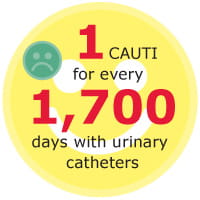What is a CAUTI?
CAUTI or a catheter-associated urinary tract infection is an infection of the urinary system, including the bladder and kidneys.
How does a CAUTI happen?
Germs (such as bacteria or yeasts) do not normally live in these areas, but if introduced via a catheter, an infection may occur.
How do we prevent CAUTIs?
At UPMC Children's Hospital of Pittsburgh, we prevent CAUTIs by taking precautions with both the insertion and maintenance of catheters:
Insertion
- We are careful to always wash hands thoroughly.
- The placement of catheter is done as a sterile procedure.
- We secure the tubing to the patient’s leg.
- The catheter system is kept closed, reducing contamination risk.
Maintenance
- We maintain a closed drainage system.
- We make sure to maintain an unobstructed urinary flow.
- We keep the fluid bag below the level of the bladder and off of the floor.
- We do not clean perianal area with antiseptics.
- We obtain all specimens via a closed access system after appropriate disinfection.

How often do catheter-associated urinary tract infections occur at Children’s Hospital?
On average, we see one urinary tract infection for every 1,700 days that patients have urinary catheters in our hospital.









